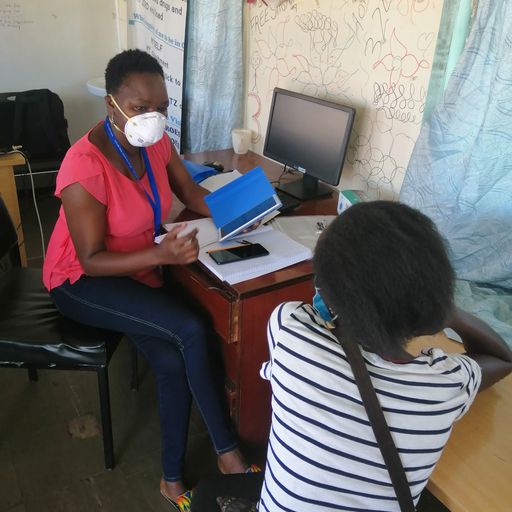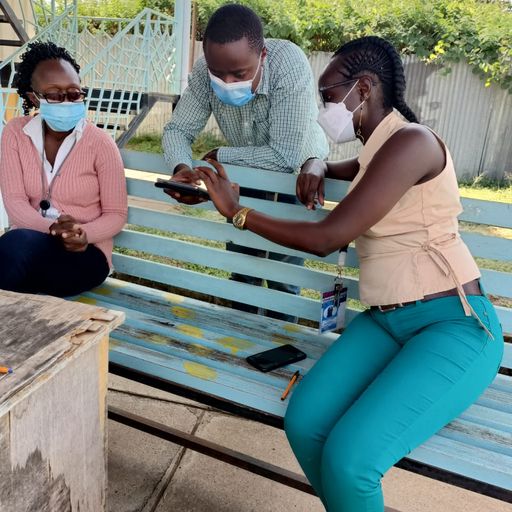Published: 10/18/2023

Can emotional abuse and depression impact a young, HIV-positive woman’s ability to receive life-saving therapy?
By Jamie Hansen, Global Health Communications Manager
In Sub-Saharan Africa, where HIV/AIDS is a leading cause of death for adolescent girls and young women, antiretroviral therapy (ART) treatments are critical to saving lives and preventing the disease from spreading. Yet many HIV-positive teenage girls and young women don’t stick with these life-saving treatments.
Now, a new publication by Stanford and Kenyan researchers finds that depression and emotional violence by an intimate partner are strongly associated with this poor adherence to treatments. The study is one of the first to illuminate the connection between domestic violence, mental health, and ART adherence in teenagers and young women. Based on these findings, the researchers are exploring a community-based solution to support mental wellness. By doing so, they hope to both address mental health challenges and increase the uptake of HIV treatments, saving lives and bolstering the fight against HIV.
In their recent publication in the International Journal of Environmental Research and Public Health, researchers found that the odds of teenage girls and young women missing their treatments more than doubled for those who reported suffering emotional violence, compared with those who did not. The odds were even higher for women with moderate or severe depression versus those with no depression or minimal depression. Young women were more likely to be depressed if they reported having experienced any intimate partner violence.
“We think these findings can raise awareness and help bridge a gap in service related to violence that has been causing young women to miss their HIV treatments,” said Isdorah Odero, a project coordinator at the Kenya Medical Research Institute (KEMRI). She was part of an interdisciplinary team of KEMRI researchers who collaborated with Stanford global health researchers on the study.
We think these findings can raise awareness and help bridge a gap in service related to violence that has been causing young women to miss their HIV treatments.
Isdorah Odero, KEMRI
A cycle of violence, poor mental health, and HIV
Around the world, violence, poor mental health, and HIV present interconnected threats to youth ages 15-24: More than half of teenagers and young women who experience violence develop mental health conditions, and those who experience multiple episodes of violence are 50% more likely to become infected with HIV.
In Kenya, the Ministry of Health has prioritized addressing high rates of youth HIV/AIDS and helping adolescents adhere better to their treatments — but has lacked the data necessary to understand the reasons for those missed treatments. Kenya isn’t alone: Women in their late teens and early twenties span the pediatric and adult age groups but have distinct physical and emotional needs, said Clinical Associate Professor of Pediatrics, Clea Sarnquist, DrPH, MPH, who has studied the interplay between gender-based violence and HIV in Sub-Saharan Africa for more than 10 years. And yet, she said, a review of HIV/AIDS interventions found only a handful that focused on women in this vulnerable age range.
“This represents a critical research gap not only in global HIV care and treatment, but also in HIV prevention,” Sarnquist said.
Against this backdrop, Sarnquist, Stanford’s Global Child Health Program Manager Jenny Kang, MPH, and Stanford PhD student Jonathan Altamirano collaborated with a team of young Kenyan researchers and graduate students assembled by Dr. Hellen Barsosio, a senior clinical research scientist and leader at KEMRI. They sought to understand whether intimate partner violence impacted HIV-positive women’s ability or willingness to receive treatment – and if so, how that barrier might be overcome. They focused on Kisumu, Kenya – a global hot spot for HIV/AIDS where youth represent over half of those infected, and where gender-based violence is increasing, researchers say. The work was funded by a Stanford Global Health Seed Grant.
“My interest was piqued because this group of adolescent girls and young women hadn’t really been spoken to, and so often just had interventions pushed down their throats,” Odero said. “We were interested in finding out, in a more structured way, whether this rising violence was hindering access to treatment for these young women and girls.”
Unexpected findings

Between January and June 2022, Odero and her colleagues surveyed more than 300 women with HIV, ages 15-24, about intimate partner violence and mental health. They asked women from urban and rural health facilities in and around Kisumu about emotional, physical, and sexual violence they’d experienced in the last year, along with questions about other adverse experiences like food insecurity and substance abuse. They also assessed the women for depression and adherence to ART treatment.
Participants reported suffering high rates of violence and depression. Just over a quarter of these 15-24-year-olds reported physical intimate partner violence, nearly 35% reported sexual violence in the last year, and almost 40% reported emotional intimate partner violence. Just over half of respondents reported some level of depression.
Researchers found that experiences of emotional intimate partner violence more than doubled the odds of poor adherence to treatments. Moderate or severe depression also more than doubled the odds of poor adherence compared with those with no depression.
Researchers were surprised to find that physical and sexual violence were not significantly associated with poor adherence in this cohort, which differs from findings in related studies. Sarnquist believes this finding could be attributed to the relatively small sample size.
Exploring community-based solutions
Once the researchers saw the connections between violence, depression, and HIV treatment, they began exploring possible solutions.
Our findings suggested a dire need for interventions that tackle violence and poor mental health in this population.
Jonathan Altamirano, Stanford PhD Student
“Our findings suggested a dire need for interventions that tackle violence and poor mental health in this population,” said Jonathan Altamirano, a Stanford PhD student in epidemiology and clinical research and lead author of the study.
Supporting young women’s mental health emerged as a clear priority, but with only about 100 psychiatrists in all of Kenya, the need is greater than the capacity.
Through interviews with the young women, researchers said one approach emerged as the most welcome, approachable, and feasible intervention: Friendship Bench. This program, developed in Zimbabwe with support from a CIGH grant via the NIH-Fogarty Global Health Equity Scholarship program, is a low-cost psychological intervention that empowers community members to support the mental health of young people. A clinical team trains community health workers, often elders such as local grandmothers, to provide cognitive behavioral therapy to young people suffering from anxiety or depression. The trained workers then sit with their clients outdoors, under the trees, on wooden park benches, creating safe spaces and a sense of belonging in communities.
This approach may resonate with the community since Kisumu already offers group safe spaces for women to talk and receive support, said Corrie Mevis Omollo, a social scientist with KEMRI’s Center for Global Health Research who helped guide the qualitative research process. The Friendship Bench would build on that by offering one-on-one support from trained community members. “I hope that as we share what we’ve learned, a project like Friendship Bench will gain a lot of interest and support from the community,” she said.
The team has begun sharing their findings at conferences in the U.S., Kenya, and Mexico, hoping to increase awareness of the barriers to treatment these young women face and build support for possible interventions.
Eucabeth Awuonda, a research officer at KEMRI who helped interview the young women in the study, said she believes something like Friendship Bench could make a huge difference for the young women they serve. “I hope a project like this can begin to sensitize our community and young women to the fact that certain things that we’ve normalized, such as being slapped or shouted at, are not really normal, and there’s a need to act on them.”
This study was supported by a grant from the Center for Innovation in Global Health and Maternal & Child Health Research Institute, both at Stanford University